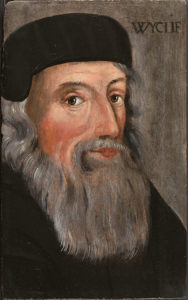Psalms & Proverbs
 For centuries, many Christians have observed the devotional practice of reading one chapter from Psalms and Proverbs a day. What amazes me is how often the Psalm and selection from Proverbs for a given day seem thematically connected. For instance, my devotional reading recently brought me to Psalm 11 and Proverbs Chapter 11.
For centuries, many Christians have observed the devotional practice of reading one chapter from Psalms and Proverbs a day. What amazes me is how often the Psalm and selection from Proverbs for a given day seem thematically connected. For instance, my devotional reading recently brought me to Psalm 11 and Proverbs Chapter 11.
It’s not always the case in Proverbs, but Chapter 11 has a discernible and repetitive pattern. You could summarize it in two statements:
The evil man seeks evil and it finds him.
The righteous man seeks good and it finds him.
Psalm 11 uses many similar images to those found in the corresponding proverbs and concludes by saying:
On the wicked God will rain fiery coals and burning sulfur; a scorching wind will be their lot. For the LORD is righteous, he loves justice; upright men will see his face.
(Reprinted from 9/15/2013)
I’m All Ears
 How many times have you heard that? How often have you found it to be true? How often do you encounter a person who seems to genuinely … interestedly listen?
How many times have you heard that? How often have you found it to be true? How often do you encounter a person who seems to genuinely … interestedly listen?
He who answers a matter before he hears it—this is folly and disgrace to him.
Proverbs 18:13
Burning Bibles .. Burning Bones
 One application on my smartphone gives me access to 59 English translations of the Bible. As staggering as that number is, it only represents 13% of the total number of Bible translations in English. I call that number “staggering” because there was a time when there were none.
One application on my smartphone gives me access to 59 English translations of the Bible. As staggering as that number is, it only represents 13% of the total number of Bible translations in English. I call that number “staggering” because there was a time when there were none.
The first known, complete translation of the Bible into English was not completed until 1382. The man credited with making it happen died peacefully just two years later, on December 30, 1384. Forty-four years after his death, bishops at the Council of Constance condemned his teachings as heretical and ordered that his bones be exhumed and burned.
His many radical views had indeed challenged the established church. He took on issues like, clerical celibacy, indulgences, praying to the saints and even questioned the legitimacy of the Papacy. That may sound like Martin Luther, but John Wycliffe preceded Luther and the Protestant Reformation by more than 100 years. While many have called him the Morning Star of the Reformation, Wycliffe is best known for that first complete English Bible. The same council that ordered his bones burned, also ordered that his writings be burned. This unfortunately included some of his “unauthorized” English translations of the Bible.
Wycliffe’s Bible translation was viewed as heretical because of the belief that gave it birth. Wycliffe had come to regard the Bible as “the only reliable guide to the truth about God and maintained that all Christians should rely on it” rather than the teachings of the church. His belief that men ought to be able to read God’s Word in their own language led directly to his work of translation. While that view hardly seems radical today, all of Wycliffe’s challenges to the authority of the Roman church sprang from his high view of God’s Word. Those challenges led to burning Bibles and burning bones.
Our Cover-2-Cover reading of the Bible in 2019 has a history that goes right back to John Wycliffe. Many men and women sacrificed for our ease of access to God’s Word … let’s not waste that opportunity.
Side note: A great organization named after John Wycliffe carries forward his belief that all men should have the Bible in their native tongue. Due to their efforts and other like-minded organizations, the entire Bible is now available in 683 different languages, with the New Testament available in 1,534. There’s still much to be done … check out their work at https://wycliffe.bible.
Questioning God
 “I will go over and see this strange sight—why the bush does not burn up.” That first question led to many more for Moses.
“I will go over and see this strange sight—why the bush does not burn up.” That first question led to many more for Moses.
- · God’s choice, “Who am I, that I should go to Pharaoh?”
- · God’s word, (But) “What if they do not believe me listen to me?”
- · God’s enablement, “I have never been eloquent, neither in the past nor since you have spoken to your servant.”
I get Moses … I understand his questions. There have been many times when I have had similar misgivings about God’s ability to use me. Let that soak in! When we focus on ourselves, the obstacles or the audience … we end up asking outrageous questions of God … like “Are you able?”
I’m grateful for a questioning God. He asked Moses three types of questions that every Christian needs to hear:
What’s in your hand? When Moses doubted that anyone would take him seriously, God asked, “What is that in your hand?” A wooden staff became a writhing serpent from which Moses ran. Something Moses had within his grasp, something he viewed as ordinary, became extraordinary when relinquished to God.
Who made you? When Moses lamented his powers of communication, God asked, “Who gave man his mouth?” The point is crystal clear, the Creator knows best the capabilities of his creature. If the Designer of the human tongue says, “You will be my witness … to the ends of the earth,” we assume nothing about our abilities, but rather trust wholly in the enabling power of His Spirit.
Who is on your side? When Moses persisted in fixating on his own capabilities, or lack thereof, God showed him that he had allies. God put Moses in partnership with his brother Aaron, so he didn’t have to face Pharaoh alone. This human support was grace upon grace, because God’s first word to Moses should have been enough. Remember Moses’ question, “Who am I, that I should go to Pharaoh?” God did not answer that query with a moral boosting pep talk … but with the greatest words of strength anyone could ever hear … “I will be with you.”
Stating the (Not So) Obvious
 “Who did Seth marry?” If Adam and Eve were the first two people, where did their sons get wives? The simple answer? The Bible doesn’t say. There are wildly speculative answers that propose two creations and two races, but these don’t square with Scripture … or the Gospel.
“Who did Seth marry?” If Adam and Eve were the first two people, where did their sons get wives? The simple answer? The Bible doesn’t say. There are wildly speculative answers that propose two creations and two races, but these don’t square with Scripture … or the Gospel.
The Bible is unambiguous in teaching that all humans now living trace their ancestry to Adam and Eve. Genesis records Adam and Eve’s special creation, then in Chapter 3:20 we’re told, “Adam named his wife Eve, because she would become the mother of all the living.” The New Testament carries this teaching forward. Jesus used our first parents as the historical foundation for His argument against divorce. Paul told the Athenians, “From one man God made every nation of men, that they should inhabit the whole earth.” Acts 17:26 Passages like Romans 5 and 1 Corinthians 15 teach that sin entered our world through the first man, Adam … and that salvation came through the second Adam, Jesus Christ. In other words, our common ancestry is not just a question of history … it’s a question of Gospel.
So, if all human life originated with Adam and Eve, where did those first wives come from? I’ve only found one answer that makes sense while remaining faithful to Scripture … Seth married one of his sisters, or possibly a niece. God’s prohibition of such relations was not given until the time of Moses. Abraham was married to his half-sister, but the Bible in no way condemns that union. Both Isaac and Jacob were married to their first cousins. Prior to the Mosaic law, marriage with close relations was not forbidden.
Was it even possible that Seth married one of his sisters? None of Adam and Eve’s daughters are mentioned by name, but we know they existed. Genesis 5 tells us that Adam was 130 years old when he fathered Seth. The passage continues, “After Seth was born, Adam lived 800 years and had other sons and daughters.” We know that Adam had at least two sons (Cain and Able) prior to this time. We are not really told when his daughters were born. One statistician estimated that if Cain and Able married and had children, Adam and Eve might have had as many as 32,000 descendants by the time Seth was born. A daughter of Eve born anywhere close to Seth’s age had time to mature to child-bearing age, since Seth did not become a parent until age 105. Even in recently recorded history, one woman is known to have birthed 69 children and she only lived to be 79. Given the longevity of the first humans, and the number of children born to each generation, imagine how exponential the population growth could have been!

